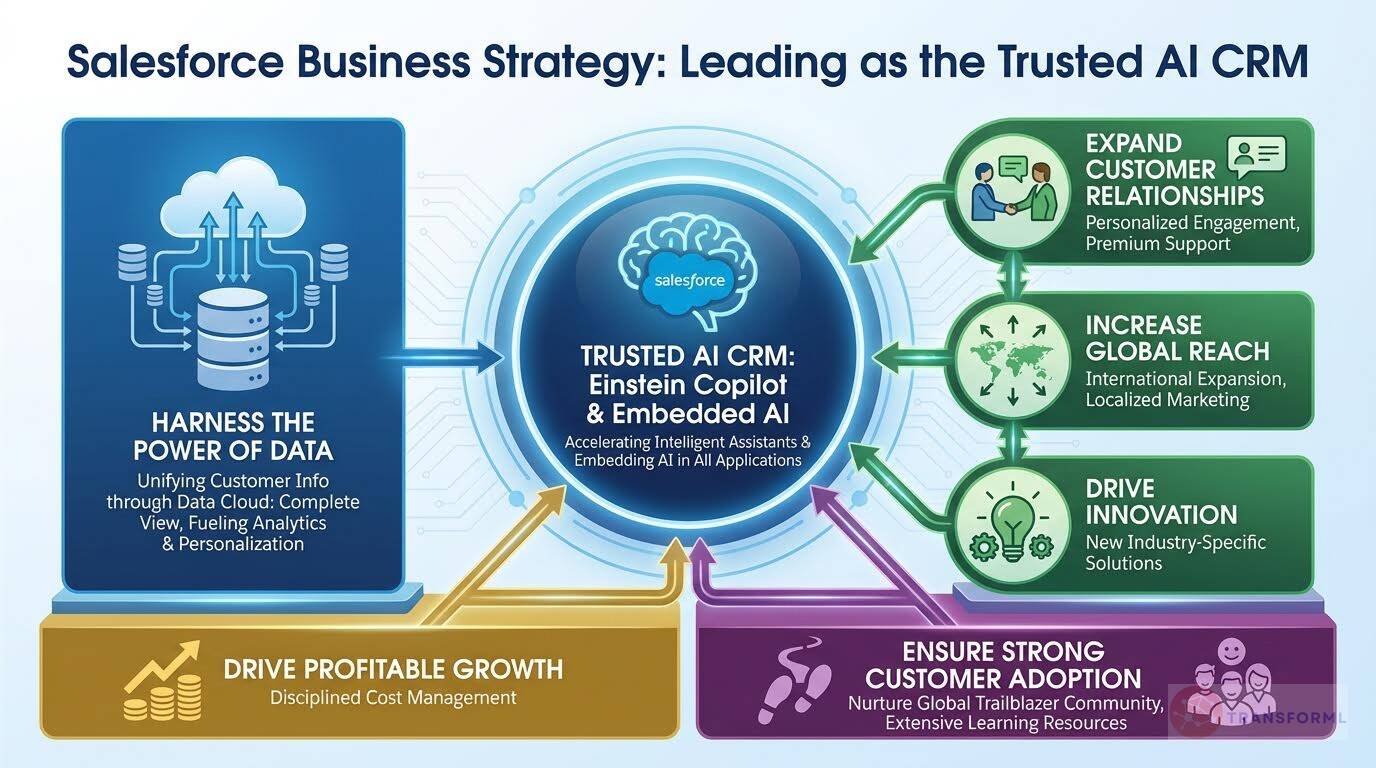Salesforce, Inc. Strategy Analysis

Editor-reviewed by Ahmad Zaidi based on analysis by TransforML's proprietary AI
CEO, TransforML Platforms Inc. | Former Partner, McKinsey & Company
Strategy overview for Salesforce, Inc.
Salesforce, Inc. is a global leader in customer relationship management (CRM) technology, offering a comprehensive AI-powered Customer 360 platform that unites sales, service, marketing, commerce, and IT teams. The company has focused on restructuring, productivity, innovation, and stronger relationships with stockholders, which has propelled it to impressive fiscal year 2024 results. Salesforce is uniquely positioned to help customers harness the power of AI to connect with their customers in a whole new way.

Key Competitors for Salesforce, Inc.
Oracle Corporation
Broad suite of enterprise applications and on-premises offerings
Microsoft
Established marketing relationships and access to larger customer bases
SAP
Significant installed bases and broader geographic scope
Adobe
Strong marketing cloud capabilities and creative software suite
ServiceNow
Strong workflow automation and IT service management capabilities
Insights from Salesforce, Inc.'s strategy and competitive advantages
What Stands Out in Salesforce, Inc. strategy
Salesforce's strategy is uniquely distinguished by its laser focus on being the definitive '#1 AI CRM' provider, deeply integrating AI specifically for customer-facing business functions. While competitors like Microsoft are infusing AI broadly across a vast product suite and Adobe is targeting the content and marketing lifecycle, Salesforce's entire narrative, from its 'Winning Aspiration' to lead the AI revolution in CRM to its product development, centers on the 'Customer 360' platform.
The 'Data Cloud' is positioned as a key differentiator, offering a fast and secure on-ramp for enterprises to activate their own private data for AI, directly addressing trust and privacy concerns. For example, the goal to 'Accelerate Einstein Copilot Development' is explicitly aimed at improving CRM user productivity, unlike Microsoft's more generalized Copilot for M365.
Furthermore, Salesforce's 'Ecosystem and Community' of 19 million Trailblazers is a significant moat, creating a loyal, skilled, and self-supporting user base that no competitor can easily replicate.
What are the challenges facing Salesforce, Inc. to achieve their strategy
Salesforce faces significant challenges from competitors who own adjacent, critical layers of the enterprise technology stack. The primary challenge comes from Microsoft, whose strategy leverages its dominance in productivity (Microsoft 365) and cloud infrastructure (Azure). Microsoft's goal to 'Integrate AI into Microsoft 365' and 'Enhance Dynamics 365 AI Capabilities' creates a deeply integrated and lower-friction alternative for millions of enterprise users, directly threatening Salesforce's core market.
Salesforce runs its Hyperforce platform on competitors' clouds, making it vulnerable to the scale and pricing power of a hyperscaler like Microsoft. A second major challenge comes from Adobe in the marketing and experience domain. Adobe's strategy to 'Enhance Creativity and Scale Content Production' by linking its Creative Cloud with its Experience Cloud presents a more holistic 'content supply chain' solution than Salesforce's Marketing Cloud alone.
Lastly, Oracle's strength in back-end enterprise systems (ERP, databases) and its strategy to provide 'Flexible IT Deployment Models' like 'Oracle Exadata Cloud@Customer' creates a sticky, integrated front-to-back office proposition for large enterprises, which can challenge Salesforce's ability to be the single central platform in those accounts.
What Positions Salesforce, Inc. to win
Market Leadership
- Salesforce maintains its position as the #1 CRM provider and is now recognized as the #1 AI CRM, uniquely positioning it to capitalize on the AI revolution.
Comprehensive Platform
- The Customer 360 platform unites sales, service, marketing, commerce, and IT teams, providing a single source of customer truth and enabling personalized experiences.
AI Innovation
- Salesforce is at the forefront of AI innovation, with trusted AI fueling solutions like Einstein 1 Platform, Data Cloud, and Einstein Copilot, empowering customers to reach new levels of innovation and growth.
Data Cloud
- Data Cloud has become the fastest-growing organic product in Salesforce's history, ingesting, unifying, and harmonizing any data type to create a 360-degree view of customers.
Ecosystem and Community
- Salesforce boasts a thriving ecosystem with 19 million Trailblazers across 100 countries, projected to create 11.6 million new jobs and $2 trillion in new business revenue worldwide by 2028.
Financial Performance
- Salesforce demonstrates strong financial performance, with $34.9 billion in revenue, a 30.5% non-GAAP operating margin, and $10.2 billion in operating cash flow.
Philanthropic Leadership
- Salesforce has a long-standing commitment to philanthropy, having given more than $700 million in grants and contributed over 8.7 million hours of volunteer service.
Customer Loyalty
- Salesforce has a high customer retention rate and a large base of enterprise customers, with over 90% of the Fortune 500 being Salesforce customers.
What's the winning aspiration for Salesforce, Inc. strategy
Salesforce aspires to lead the AI revolution in the CRM space, empowering businesses of all sizes to connect with their customers in unprecedented ways through trusted AI and data-driven insights, while also creating a better world for all stakeholders.
Company Vision Statement:
Company Vision Statement - Salesforce brings together best-in-class CRM apps for sales, service, marketing, commerce and more, with trusted AI and data all on one integrated platform.
Where Salesforce, Inc. Plays Strategically
Salesforce strategically focuses on expanding its presence across various industries and geographies, targeting businesses of all sizes with its integrated Customer 360 platform. It leverages its partner ecosystem and invests in international operations to extend its reach and deliver tailored solutions.
Key Strategic Areas:
How Salesforce, Inc. tries to Win Strategically
Salesforce aims to win by delivering an industry-leading, AI-powered CRM platform that provides a single source of truth for customer data, enabling businesses to personalize every interaction and drive growth. It leverages its innovative technology, extensive ecosystem, and commitment to customer success to create a sustainable competitive advantage.
Key Competitive Advantages:
Strategy Cascade for Salesforce, Inc.
Below is a strategy cascade for Salesforce, Inc.'s strategy that has been formed through an outside-in analysis of publicly available data. Scroll down below the graphic to click on the arrows to expand each strategic pillar and see more details:
Related industry articles:
Drive Profitable Growth
Focus on delivering profitable growth and margin expansion through disciplined cost management and operational excellence.
Implement Cost Optimization Initiatives
Identify and implement cost-saving measures across all departments, including streamlining processes, reducing discretionary spending, and optimizing resource allocation, to improve overall profitability.
Enhance Sales Productivity
Improve sales efficiency by providing sales teams with better tools, training, and resources to close deals faster and increase revenue per sales representative.
Optimize Pricing Strategies
Evaluate and adjust pricing models to maximize revenue and profitability while remaining competitive in the market.
Improve Cash Flow Management
Implement strategies to accelerate cash collection, optimize payment terms, and improve overall cash flow management to enhance financial stability.
Lead with Trusted AI CRM
Maintain leadership in the CRM market by integrating and leveraging trusted AI technologies across all service offerings.
Accelerate Einstein Copilot Development
Prioritize the development and enhancement of Einstein Copilot, focusing on features that improve user productivity and provide personalized AI assistance within Salesforce applications.
Expand AI Training Data Sets
Invest in acquiring and curating high-quality, diverse data sets to improve the accuracy and reliability of AI models used in Salesforce products.
Establish AI Ethics Governance
Develop and implement a comprehensive AI ethics framework to ensure responsible and ethical use of AI technologies within Salesforce products and services.
Integrate AI into Core CRM Applications
Embed AI-powered features and functionalities into Sales Cloud, Service Cloud, Marketing Cloud, and Commerce Cloud to enhance their capabilities and provide users with intelligent insights and automation.
Harness the Power of Data
Unify and leverage customer data through Data Cloud and the Einstein 1 Platform to create a 360-degree view of customers and power AI, automation, and analytics.
Enhance Data Cloud Integration Capabilities
Develop new connectors and APIs to seamlessly integrate Data Cloud with a wider range of data sources, including third-party applications and legacy systems.
Promote Data Cloud Adoption
Drive adoption of Data Cloud among existing Salesforce customers by showcasing its benefits and providing training and support resources.
Improve Data Governance and Security
Implement robust data governance policies and security measures to ensure the privacy, security, and compliance of customer data stored in Data Cloud.
Develop Data-Driven Insights
Create new analytics dashboards and reports within the Einstein 1 Platform that leverage Data Cloud to provide customers with actionable insights and a 360-degree view of their customers.
Expand Customer Relationships
Deepen relationships with existing customers through cross-selling, upselling, and providing additional support offerings.
Personalize Customer Engagement
Leverage data and AI to deliver personalized customer experiences across all touchpoints, including marketing campaigns, sales interactions, and service interactions.
Improve Customer Success Programs
Enhance customer success programs by providing more proactive support, tailored training, and advisory services to help customers achieve their business goals.
Increase Service Offering Adoption
Promote the adoption of multiple Salesforce service offerings among existing customers by highlighting the benefits of an integrated CRM platform.
Develop Premium Support Packages
Create and market premium support packages that offer enhanced service levels, priority access to technical resources, and proactive monitoring to meet the needs of enterprise customers.
Increase Geographic Reach
Grow the business by selling to new customers in new regions and developing distribution channels through marketplaces and partners.
Expand International Sales Teams
Invest in building and training sales teams in key international markets to increase market penetration and drive revenue growth.
Create and Implement Localized Marketing Campaigns
Create and implement localized marketing campaigns that resonate with customers in different regions and cultures.
Establish Strategic Partnerships
Forge strategic partnerships with local system integrators, consulting firms, and technology providers to expand our reach and deliver solutions tailored to specific regional needs.
Invest in Hyperforce Expansion
Accelerate the deployment of Hyperforce to new regions to provide customers with autonomy and control over data residency and comply with local regulations.
Focus on Industries and New Products
Deliver innovative and value-driven solutions in new categories based on customer needs, including industry-specific solutions and new product offerings.
Accelerate Industry Cloud Development
Increase investment in the development of industry-specific cloud solutions that address the unique needs of customers in key verticals such as financial services, healthcare, and manufacturing.
Enhance Einstein 1 Platform Capabilities
Develop new features and functionalities for the Einstein 1 Platform that enable customers to build AI-powered apps and deliver entirely new CRM experiences.
Explore Emerging Technologies
Invest in research and development to explore emerging technologies such as blockchain, IoT, and augmented reality and identify opportunities to integrate them into Salesforce products.
Foster Customer-Driven Innovation
Establish feedback loops and collaboration programs to gather customer insights and incorporate them into the product development process.
Promote Strong Customer Adoption and Reduce Customer Attrition
Enable and accelerate customer digital transformations through customer success programs, curated resources, and a strong community of Trailblazers.
Expand Trailhead Learning Paths
Develop new Trailhead learning paths and certifications that focus on emerging technologies, industry-specific solutions, and best practices for using Salesforce products.
Strengthen Trailblazer Community
Invest in programs and initiatives that foster a strong and engaged Trailblazer community, providing members with opportunities to connect, collaborate, and share their expertise.
Enhance Success Management Resources
Provide customers with access to dedicated success managers, advisory services, and technical architects who can help them plan and execute their digital transformations.
Develop Curated Resource Libraries
Create and maintain curated resource libraries that provide customers with easy access to best practices, implementation guides, and other helpful materials.
Read more about industry strategies
Source and Disclaimer: This analysis is based on analysis of Annual reports for FY24. For informational purposes only (not investment, legal, or professional advice). Provided 'as is' without warranties. Trademarks and company names belong to their respective owners.
